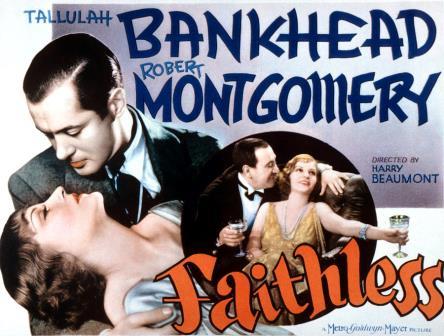They’ve just no character. Neglect your character and you lose your self-respect. Go out into the streets and you end up in the gutter – where I might add, you jolly well deserve to end up. – Carol Morgan
Warner Brothers is usually taken as the studio that presented gritty and earthy films in the 1930s which the average American could relate with, whereas MGM is usually the studio of glamour and glitz. But at times, such as in 1932’s Faithless, studios tried to stretch their legs- with varying degrees of success.
Faithless is one of those times where MGM tried to be more like Warner Brothers and present perhaps a more down to earth story depicting ‘real people.’ Here it is Tallulah Banked (as Carol Morgan) and Robert Montgomery (as Bill Wade) in a classic riches to rags story.
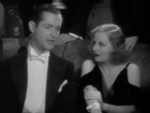 Carol is the wealthy woman engaged to Bill, but she’s concerned about his career prospects as he earns only $20,000 a year. Granted those are in 1932 dollars, which would be well into the six figures today, so it’s not as if he’s flipping burgers making minimum wage. In all reality Carol is shallow enough to turn down a really comfortable lifestyle with Bill for her current truly opulent one.
Carol is the wealthy woman engaged to Bill, but she’s concerned about his career prospects as he earns only $20,000 a year. Granted those are in 1932 dollars, which would be well into the six figures today, so it’s not as if he’s flipping burgers making minimum wage. In all reality Carol is shallow enough to turn down a really comfortable lifestyle with Bill for her current truly opulent one.
True to form, Carol loses her fortune then suddenly finds Bill much more desirable, only to learn that Bill’s been let go the same day. They part as Bill heads to Chicago, having found a new job. With funds running low, Chicago follows- but not to be with Bill, but to move from house to house as a guest of the wealthy.
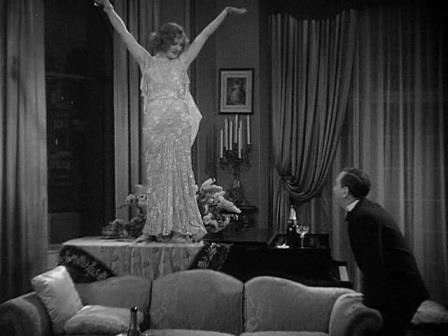 Things go from bad to worse, as Bill finally reappears just in time to catch Carol with her lover Peter (Hugh Herbert in a rare dramatic turn), whose keeping her in a secret apartment so he wife won’t learn of the affair.
Things go from bad to worse, as Bill finally reappears just in time to catch Carol with her lover Peter (Hugh Herbert in a rare dramatic turn), whose keeping her in a secret apartment so he wife won’t learn of the affair.
Carol finally leaves Peter for Bill who has forgiven her, but he loses yet another job. They marry and he finds a job as a scab driving a truck, but is badly injured as striking workers intentionally ram his delivery truck. With no money coming in, Carol turns to prostitution to cover the bills while she nurses Bill back to health until finally he recovers, but learns the truth in the process.
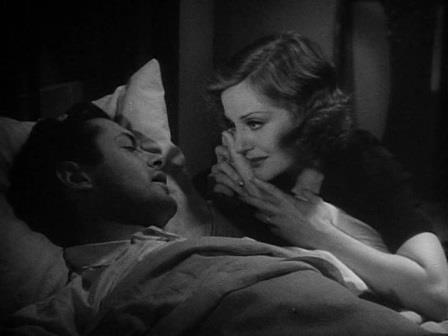 Faithless sadly fails to add much new to a tried and true formula, though the title is perhaps a bit overly harsh as Carol knows she’s likely throwing away her marriage by walking the streets, but also knows she has few if any remaining options.
Faithless sadly fails to add much new to a tried and true formula, though the title is perhaps a bit overly harsh as Carol knows she’s likely throwing away her marriage by walking the streets, but also knows she has few if any remaining options.
In one of her better early film performances, Tallulah Bankhead does show a bit more depth than in most of her pictures. However, she’s unable to come across effectively at all in the ‘rags’ portion of the picture. It’s extremely clear that she’s much more at ease in the opulent Adrian gowns that she’s in for most of the picture, though strangely they fit as if they were fitted for a different actress. Surely not what was intended!
Overall though Faithless is one of Bankhead’s better pictures, the overall feel is almost as if it was a role originally intended for Joan Crawford. When left to her own devices here, Bankhead seems stiff and almost clunky in her delivery. As in many of her pictures from the period, there only one speed for Tallulah and that’s full speed ahead- but again she’s never been known for her subtlety.
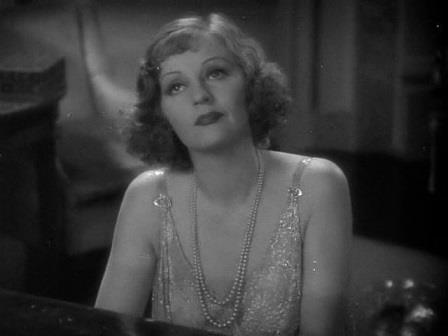 Faithless was Bankhead’s last picture for over a decade, and to some extent her career mirrors the picture somewhat. Though at least partially her own choice as her acting style works better on Broadway, Bankhead’s behavior and alleged sexual promiscuity made her taboo for most studios to touch even if they’d been willing to pay her exorbitant salary demands.
Faithless was Bankhead’s last picture for over a decade, and to some extent her career mirrors the picture somewhat. Though at least partially her own choice as her acting style works better on Broadway, Bankhead’s behavior and alleged sexual promiscuity made her taboo for most studios to touch even if they’d been willing to pay her exorbitant salary demands.
As you’d expect as Carol’s fortunes decline so does her attire (though perhaps not as much as you’d expect it to), but yet her makeup and hair seem entirely unimpacted. The same is true for Robert Montgomery, who also excels much more in the earlier portions of the picture. He’s still jaunty and dapper and without a hair out of place for the entire picture – even when he is in his sick bed.
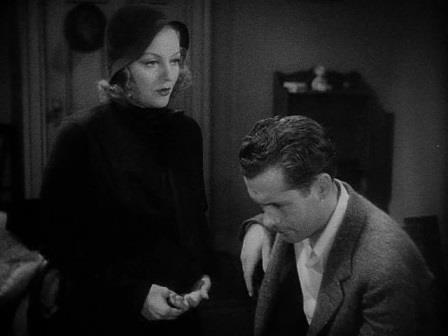 Here MGM is betrayed by its roots as the movie lacks grit and realism. Warners surely would have smeared a bit of grim on the two leads and lessened the opulence of their living conditions as we flow through this saga. Even the Wade’s final apartment per MGM seems more typically middle class than that of a couple struggling just to pay for their next meal.
Here MGM is betrayed by its roots as the movie lacks grit and realism. Warners surely would have smeared a bit of grim on the two leads and lessened the opulence of their living conditions as we flow through this saga. Even the Wade’s final apartment per MGM seems more typically middle class than that of a couple struggling just to pay for their next meal.
Hugh Herbert as Perter Blainey is one of the surprises of the picture. Usually used in more sketch oriented or comedic roles, here he is more dramatic as Carol’s wealthy benefactor in Chicago. It’s a rather odd and unusual casting choice, but one that works wonderfully onscreen.
In spite of these at times significant obstacles, Faithless is an enjoyable if unoriginal film. There’s odd and perhaps unintentional snippets of humor. Thankfully it’s a pre-code film- which should be obvious from the subject matter and some of the onscreen activities- and as such doesn’t have a classic rosy ending.
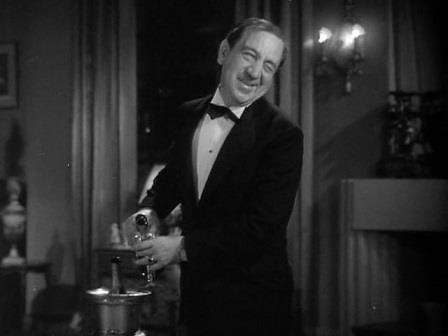 While Faithless does try feebly to make some sort of commentary that love will get people through everything, at least at the end of the day Bill and Carol aren’t presented with anything more. There’s no big money pot at the end of the rainbow or worse still a return to Carol’s pre-fall life of opulence.
While Faithless does try feebly to make some sort of commentary that love will get people through everything, at least at the end of the day Bill and Carol aren’t presented with anything more. There’s no big money pot at the end of the rainbow or worse still a return to Carol’s pre-fall life of opulence.
